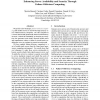Free Online Productivity Tools
i2Speak
i2Symbol
i2OCR
iTex2Img
iWeb2Print
iWeb2Shot
i2Type
iPdf2Split
iPdf2Merge
i2Bopomofo
i2Arabic
i2Style
i2Image
i2PDF
iLatex2Rtf
Sci2ools
112
click to vote
OSDI
2004
ACM
2004
ACM
Enhancing Server Availability and Security Through Failure-Oblivious Computing
We present a new technique, failure-oblivious computing, that enables servers to execute through memory errors without memory corruption. Our safe compiler for C inserts checks that dynamically detect invalid memory accesses. Instead of terminating or throwing an exception, the generated code simply discards invalid writes and manufactures values to return for invalid reads, enabling the server to continue its normal execution path. We have applied failure-oblivious computing to a set of widely-used servers from the Linux-based opensource computing environment. Our results show that our techniques 1) make these servers invulnerable to known security attacks that exploit memory errors, and 2) enable the servers to continue to operate successfully to service legitimate requests and satisfy the needs of their users even after attacks trigger their memory errors. We observed several reasons for this successful continued execution. When the memory errors occur in irrelevant computations, f...
Critical Data Structures | Failure-oblivious Computing | Memory Errors | Operating System | OSDI 2004 |
Related Content
| Added | 03 Dec 2009 |
| Updated | 03 Dec 2009 |
| Type | Conference |
| Year | 2004 |
| Where | OSDI |
| Authors | Martin C. Rinard, Cristian Cadar, Daniel Dumitran, Daniel M. Roy, Tudor Leu, William S. Beebee |
Comments (0)

